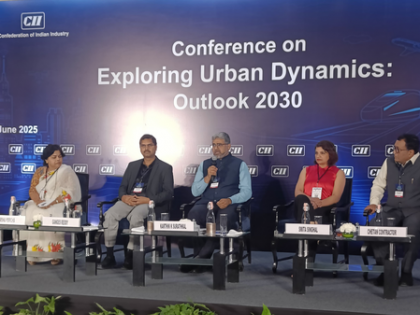India’s urban headcount likely to surge by 70 million in next 20 years
By IANS | Updated: June 20, 2025 15:28 IST2025-06-20T15:25:00+5:302025-06-20T15:28:41+5:30
New Delhi, June 20 India Inc. must take up infrastructure building in cities in partnership with municipal corporations ...

India’s urban headcount likely to surge by 70 million in next 20 years
New Delhi, June 20 India Inc. must take up infrastructure building in cities in partnership with municipal corporations as the country is expected to add 70 million new urban residents in the next two decades by 2045, a senior official said on Friday.
Addressing a CII conference here, D Thara, Additional Secretary, Ministry of Housing and Urban Affairs, said that there is a disconnect between India’s economic ambitions and the capacities of its urban local bodies, so the private sector needs to be proactively engaged in the urban development of the country.
“India is a rich nation with poor municipalities,” she remarked.
She was delivering the keynote address at a CII conference on ‘Exploring Urban Dynamics: Outlook 2030’.
She said the growing urban population poses challenges and opportunities as the country will see the creation of many more cities, calling for a pragmatic, revitalisation-first approach to urban development.
She underlined the need for targeted interventions to upgrade existing cities, backed by significant investment. The proposed Urban Challenge Fund, she explained, is intended to catalyse this transformation with a mix of 25 per cent public sector seed funding, 50 per cent market capital, and 25 per cent state contribution.
“It’s not about building afresh,” she said, “It’s about fixing what already exists - legacy infrastructure, greenfield areas, and urban governance systems.”
Prasad Gadkari, executive director & chief strategy officer at NIIF, echoed the importance of enabling frameworks to unlock capital.
“A robust pipeline of projects, predictable revenue streams, and standardised bidding processes are essential,” he said, noting NIIF’s readiness to back urban infrastructure initiatives through scalable public-private partnerships.
Abedalrazq Khalil, Practice Manager for Urban and Land at the World Bank, placed India’s urbanisation in a global perspective.
“
He further emphasised the need for integrated planning and livability as critical to attracting private investment.
Transport integration also featured prominently, with the Regional Rapid Transit System (RRTS) cited as a model for enabling distributed urban employment. In-situ slum redevelopment and smaller-scale, private-led urban initiatives were also discussed as vital components of revitalisation.
--IANS
sps/dan
Disclaimer: This post has been auto-published from an agency feed without any modifications to the text and has not been reviewed by an editor
Open in app